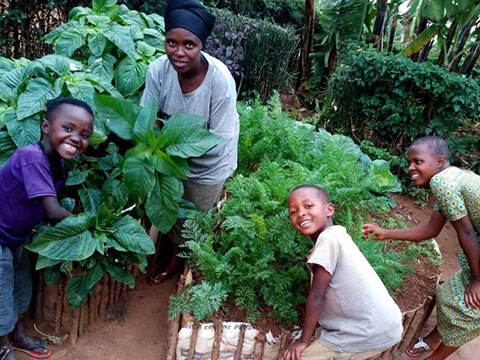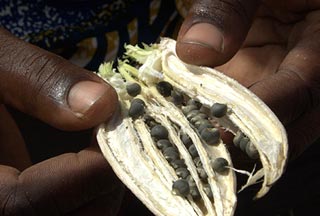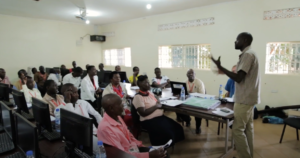ECHOcommunity Mobile App Now Available in 11 Languages
The ECHOcommunity Mobile App allows missionaries and development workers to download agricultural resources when the internet is available and then use and

Help families move from barely surviving to thriving when you join the special ECHO Thrive Team. Your monthly gift ensures life-changing trainings and resources are available. For as little as $10 a month, you can make a lasting difference. Monthly giving is a convenient way to give and show you care – with powerful results.

ECHO’s Online Gift Catalog gives you the opportunity to donate in honor of a loved one. Your hard-earned money will reduce hunger and improve lives worldwide and your recipient will have the heartwarming feeling of knowing that a gift was made in their name!
The ECHOcommunity Mobile App allows missionaries and development workers to download agricultural resources when the internet is available and then use and

When agricultural lands are depleted or overgrazed, incomes dwindle and
Elevator Speech: ECHO is a global Christian organization that provides agricultural training and resources for those who work with small-scale farmers around the world.
· Approximately 795 million people across the world are hungry.
· More than 9 million children under age 5 die every year, and malnutrition accounts for more than one-third of these deaths. Most of these children live in sub-Saharan Africa and South Asia.
· About 5.6 million deaths of children worldwide are related to under-nutrition. This accounts for 53 percent of the total deaths for children under 5.
· More than 140 million or 25 percent of all children in developing countries are underweight and at risk from the long-term effects of malnourishment.
· Worldwide, 161 million preschool children suffer from chronic malnutrition.
· ECHO is a non‐profit, interdenominational Christian organization with a 501 (c) (3) classification from the IRS.
· Its primary mandate is to reduce hunger and improve lives by strengthening the work of missionaries, development workers, national non‐governmental organizations and community leaders assisting the small‐scale farmers or urban gardeners around the world.
· ECHO is a growing network for sharing information, ideas, techniques and solutions to problems through experience, education, resources and seed packets.
· In the 1970s, Indiana businessman Richard Duggar led a group of high school students on a visit to Haiti. He was deeply moved by the plight of the Haitian people.
· He and several others made a commitment to share their time and resources to help meet the needs they saw in Haiti.
· ECHO (Educational Concerns for Haiti Organization) was formed.
· In 1981, Dr. Martin Price became the Executive Director of ECHO.
· ECHO’s name was changed to reflect its growth to Educational Concerns for Hunger Organization.
· As ECHO’s role in international agricultural development grew, its mission became “Equipping people with agricultural resources and skills to reduce hunger and improve the lives of the poor.”
· Today, after some 30+ years, ECHO continues to grow, opening Regional Impact Centers in Thailand, Tanzania and Burkina Faso and maintaining a Latin America/Caribbean connection from the North Ft. Myers, Florida location.
· ECHO places key information into the hands of development workers through the ECHO Development Notes (EDN). This quarterly technical document addresses challenges and solutions facing small‐scale farmers.
· ECHO provides a Technical Response Unit (TRU). ECHO staff members respond to agricultural and technical questions and provide answers from a variety of sources.
· ECHO provides an online portal. ECHOcommunity.org provides accessibility to our information with our entire digital library in over 30 languages.
· ECHO has published several books. Amaranth to Zai Holes: Ideas for Growing Food under Difficult Conditions; Edible Leaves of the Tropics and Agricultural Options for the Small‐Scale Farmer.
· ECHO sends seeds for food, forage and agroforestry. There is no charge for development workers, though the recipient is asked to report to ECHO on the performance and acceptance of the new plants.
· ECHO offers study and training opportunities. From interns to development workers to missionaries, ECHO offers training classes appropriate to their work in tropical areas.
· ECHO organizes international agricultural conferences, forums and symposiums.
· Development workers and missionaries gather to share innovative ideas and to network with one another.
· ECHO maintains a demonstration farm and nursery. The Global Farm and Appropriate Technology area serve as a living classroom. The nursery offers a large collection of hard‐to‐find herbs, fruit trees and tropical vegetables.
· ECHO conducts research in collaboration with colleges and universities. This research focuses on practical ideas that can help the poor operate on low budgets and directly affects farmers living in developing countries.
17391 Durrance Road
North Fort Myers, FL 33917
239.543.3246
info@echonet.org
We are voluntarily evaluated for financial transparency and accountability by these independent third-party organizations.
ECHO, Inc. is a 501(c)3 nonprofit organization registered under EIN: 23-7275283.